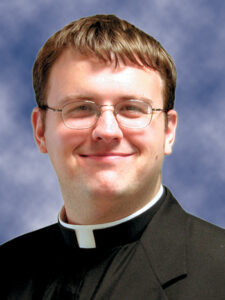 Dear Parishioners,
Dear Parishioners,
Over the last few weeks, I have implemented the moderate use of Latin in the liturgy of our parish with the “Holy Holy Holy” and the “Lamb of God” being sung in Latin. Some people absolutely love this change because it reminds them of how Mass was said in their youth and it makes the liturgy more solemn. Others do not like it for various reasons. (I do not want to guess those reasons here because so far no one has given me a clear reason and I do not want to put any words in people’s mouths.) So, for those who are open, I would like to reflect on several reasons why the Church has adopted Latin for use in the liturgy and why it remains important for us to cherish it today.
First, Latin is a sign of the catholicity and unity of the Church. It shows catholicity because the Church refuses to play favorites between all the language and ethnic groups that are her members. The Church even required people she evangelized that were never part of the Roman Empire (including the Irish and sub-Saharan Africans) to have Mass in Latin. It shows the unity of the Church because people can pray the same prayers in the Mass no matter where they are in the world. Furthermore, these prayers unite the modern Church with the Church in previous ages.
Second, Latin is a sign that the faith itself is unchangeable. Latin is an incredibly stable language. For example, one can study Cicero (d. 43 BC) and then read St. Thomas Aquinas (d. 1274) (and see that maybe there is new vocabulary and a less complicated grammar). The time span between them is greater than between ourselves and Geoffrey Chaucer. But, I doubt many people can read his Middle English as easily as someone in the Middle Ages could read the classics. Because of this stability in language, it was easier to define and defend the truths of the faith. Furthermore, as we see with the New Translation of the Roman Missal (in 2011), it becomes necessary to update translations of the liturgy as language changes. When the liturgy remains in Latin, there is no need for a new translation.
Third, Latin has a noble character that sets it apart from other languages. Latin was the language of ancient Rome and of places of learning for many centuries. For a time it was the most widely spoken language in the cultural world. The Latin liturgy is not a translation from Greek but something that grew organically and spontaneously, existing before the prayers were codified. It is also one of the three languages listed on the Cross of Christ and therefore consecrated by Christ’s sacrifice.
Fourth, the Latin language lends an air of mystery and awe to the liturgy. The language itself acts as a veil of adoration. It raises the actions in Mass above our ordinary life and reminds us that we are entering into sacred time. In this way, the Church is showing the emphasis is on the mysteries themselves. She is calling Christians to look beyond the words being used and to focus on the sacred actions. Sometimes, when one understands the words at Mass in the vernacular, it can lead to a complacence because one can fool themselves into thinking they understand the full meaning of what is being said. But, in the Mass we need to be open to the sacred mystery of God’s revelation.
Fifth, the Second Vatican Council did not ban the use of Latin in the liturgy. According to Optatam Totius (Decree on the Training of Priests), all seminarians, “are to acquire knowledge of Latin which will enable them to understand and make use of the sources of so many sciences and documents of the Church.” (13) Likewise, Sacrosanctum Concilium (Decree on the Constitution of the Sacred Liturgy) says, “[T]he use of the Latin language is to be preserved in the Latin rite.” (36, p1) However, the same document does allow for the Church to use the “mother tongue” in Mass or while administering the sacraments for the good of the people. (36, p2) But, an allowance of one thing does not usually mean the banning of another.
I hope these reasons clarify why I am allowing certain parts of the mass to be in Latin. I do not have plans to make the whole Mass in Latin. However, I think for the reasons given, it’s good for us to have some Latin in the liturgy.
God bless,
Father Carter



